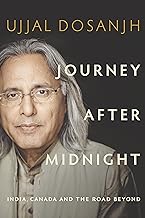
Ujjal Dosanjh was raised in a village in the Punjab and joined an exodus of young Indians to the UK where he strengthened his English language skills before applying to emigrate to Canada in 1968. He settled in South Vancouver and pursued higher education at Vancouver Community College at Langara, Simon Fraser University and then the UBC Law School. He was called to the bar in 1977. He was elected to the BC legislative assembly in 1991 as an NDP member and eventually served as the provincial Attorney General and then Premier of British Columbia from 2000-2001. He later was elected to the federal House of Commons and served as Minister of Health in Paul Martin’s Liberal government until his defeat in the 2011 general election. Dosanjh lives in Vancouver.

Fiction
The Past is Never Dead: A Novel
New Delhi: Speaking Tiger, 2023.
Publisher’s Synopsis (From its website)
In the year 1952, Kalu escaped Banjhan Kalan in Punjab’s Hoshiarpur for Bedford in the British Midlands, hoping to find a life of dignity that he had been denied because of his caste. He was in his late teens and had grown up believing in Sikhism’s tenet of equality preached by Guru Nanak and Ravidas, a principle the villagers never sincerely practised. They had maimed his father, accusing him of stealing a zamindar’s ox; they had thrown father and son out of a Quit India rally; they had mercilessly thrashed young Kalu himself for daring to enter a temple. He had never been allowed to forget—even by his schoolmates—that he was a Chamar, destined to skin dead cattle like his ancestors.
England promised a new life of respect and opportunity. But Kalu’s fellow expatriates had brought caste along when they came to that country, and he would be forced to adhere to its degrading rules just as he was in Banjhan. Determined not to bend—as he had refused to do back home—Kalu fights back, but his resoluteness in the struggle will put him and his family at serious risk.
The Past Is Never Dead is not only the story of a rural Punjabi family’s search for a better life, it is also a powerful depiction of the stranglehold of caste over Sikh immigrants in Britain. But even as it exposes the horror and obstinacy of caste, the novel pays tribute to the courage and tenacity of the human spirit and its capacity for hope.

Non-fiction (Memoir)
Journey After Midnight: A Punjabi Life from India to Canada
New Delhi: Speaking Tiger Books, 2016.
Publisher’s Synopsis (From its website)
Born in rural Punjab just months before Indian independence, Ujjal Dosanjh emigrated to the UK, alone, when he was eighteen and spent four years making crayons and shunting trains while he attended night school. Four years later, he moved to Canada, where he worked in a sawmill, eventually earning a law degree, and committed himself to justice for immigrant women and men, farm workers and religious and racial minorities. In 2000, he became the first person of Indian origin to lead a government in the western world when he was elected Premier of British Columbia. Later, he was elected to the Canadian parliament.
Journey After Midnight is the compelling story of a life of rich and varied experience and rare conviction. With fascinating insight, Ujjal Dosanjh writes about life in rural Punjab in the 1950s and early ’60s; the Indian immigrant experience—from the late 19th century to the present day—in the UK and Canada; post-Independence politics in Punjab and the Punjabi diaspora— including the period of Sikh militancy—and the inner workings of the democratic process in Canada, one of the world’s more egalitarian nations.
He also writes with unusual candour about his dual identity as a first-generation immigrant. And he describes how he has felt compelled to campaign against discriminatory policies of his adopted country, even as he has opposed regressive and extremist tendencies within the Punjabi community. His outspoken views against the Khalistan movement in the 1980s led to death threats and a vicious physical assault, and he narrowly escaped becoming a victim of the bombing of Air India Flight 182 in 1985. Yet he has remained steadfast in his defence of democracy, human rights and good governance in the two countries that he calls home—Canada and India. His autobiography is an inspiring book for our times.
Journey After Midnight: India, Canada and the Road Beyond
Vancouver: Figure 1 Publishing, 2016.
Links
Publisher Speaking Tiger Books